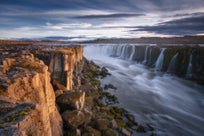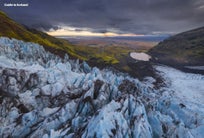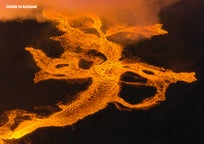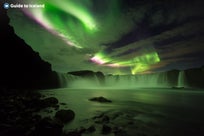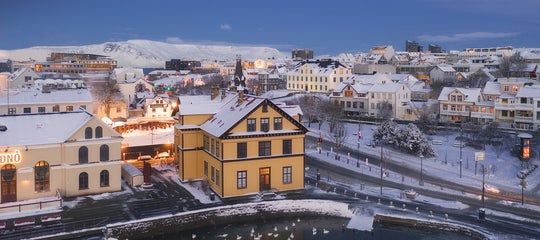
10 Insane Photos of the Fagradalsfjall Volcanic Eruption in Geldingadalur

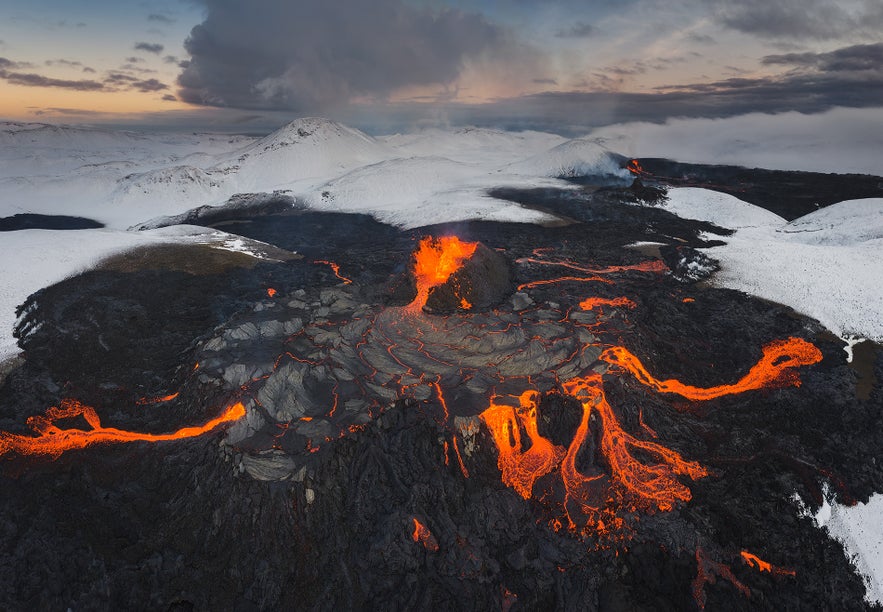
Check out these breathtaking photos of the Fagradalsfjall volcanic eruption in Geldingadalur, Iceland!
- Read about the most recent 2022 volcanic eruption of Fagradalsfjall volcano
It took seven years of waiting since Holuhraun’s eruption in 2014, but a new volcano finally went off in Iceland in 2021! Fagradalsfjall, a shield volcano on the Reykjanes Peninsula that has been dormant for 6,000 years, awoke at 21:30 on March 19th.
Many flocked to the spectacular eruption site with their drones and cameras, hoping to capture the perfect image of this magnificent and rare phenomenon. Thankfully, however, we have award-winning photographer Iurie Belurgurschi on hand to do the job for us! Here, we have compiled ten of his most insane photos of the Fagradalsfjall volcanic eruption at Gelingadalur.
- See also: Photo Tours
1: Geldingadalur in its Glory
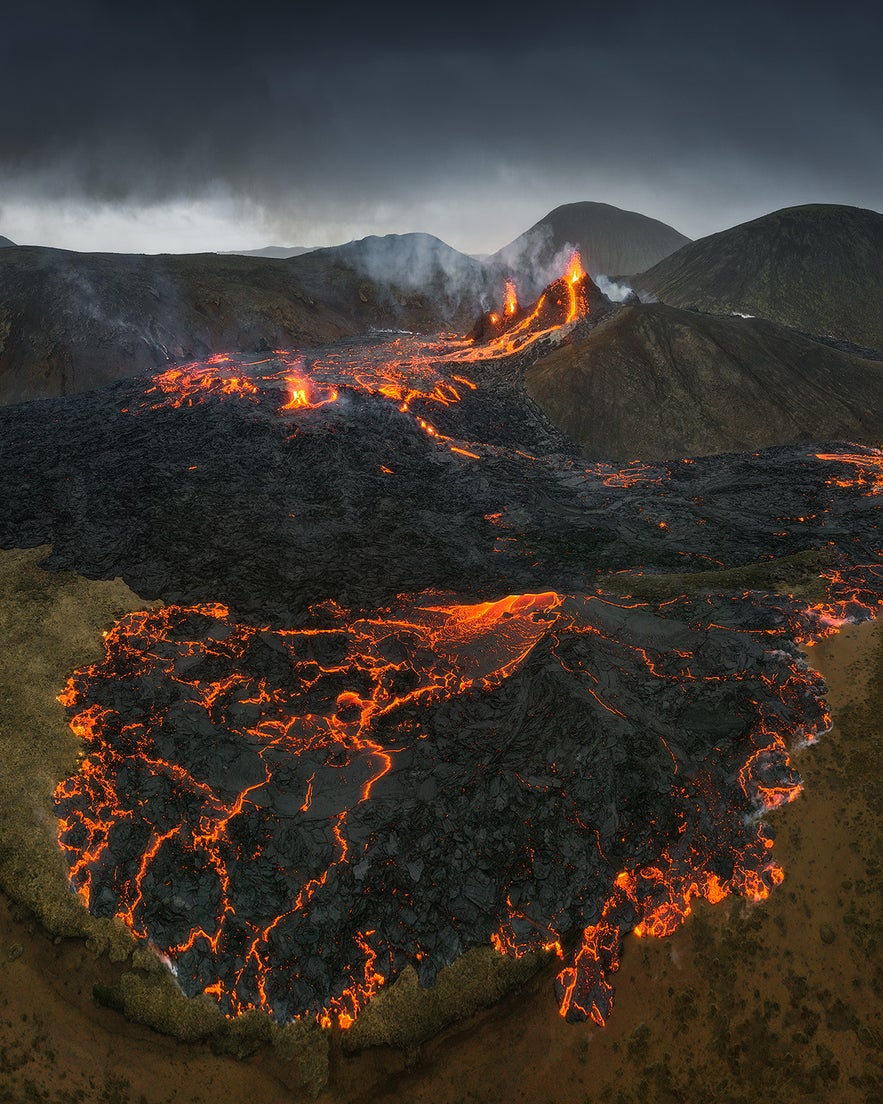
What better way to start than with an aerial portrait of Fagradalsfjall in all its glory. Peaks spitting fire, craters unfurling smoke, molten rivers, and a glowing plane of brand new earth reveal the beauty and power of Iceland’s volcanic forces.
In this photograph, you can see there are no buildings, roads, or other signs of infrastructure in Geldingadalur. Not only does this explain why this eruption raised little concern in terms of the damage it could do, but it also adds to the primordial ambience of the scene. It is no wonder why so many have made comparisons to the fiery lands of Middle Earth’s Mordor.
- See also: Volcano Tours
2: Rivers of Lava
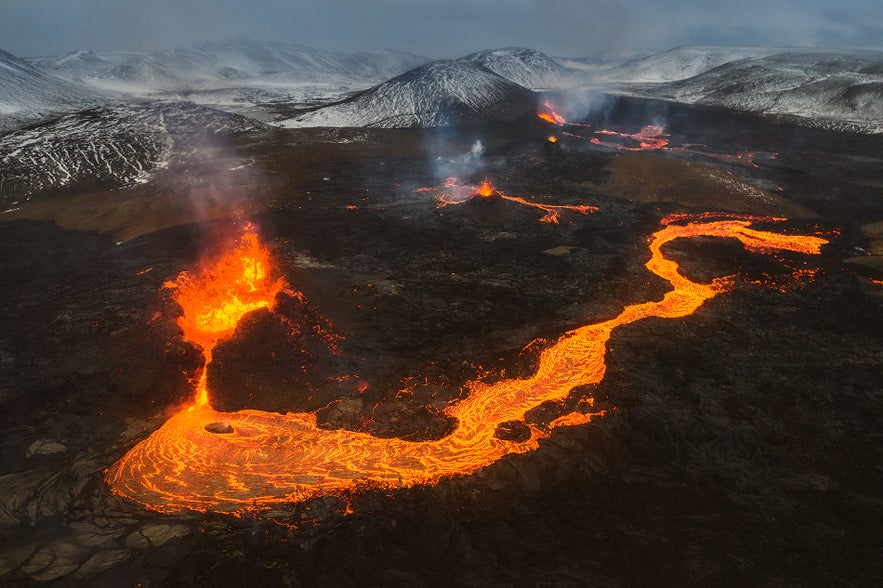
Fagradalsfjall in Geldingadalur was an effusive volcano rather than an eruptive one. The lava emerged from the rift and craters in a gentle flow of rivers, rather an explosion of magma, rock, and ash.
This allowed Iurie and other photographers to get close enough to this site to photograph it in such majesty and explains why no one was particularly concerned about its impact on agriculture or air travel.
Here, these rivers can be seen at night, forming orange veins through a sea of black.
3: A Contrast Between Grasslands and Lava Fields
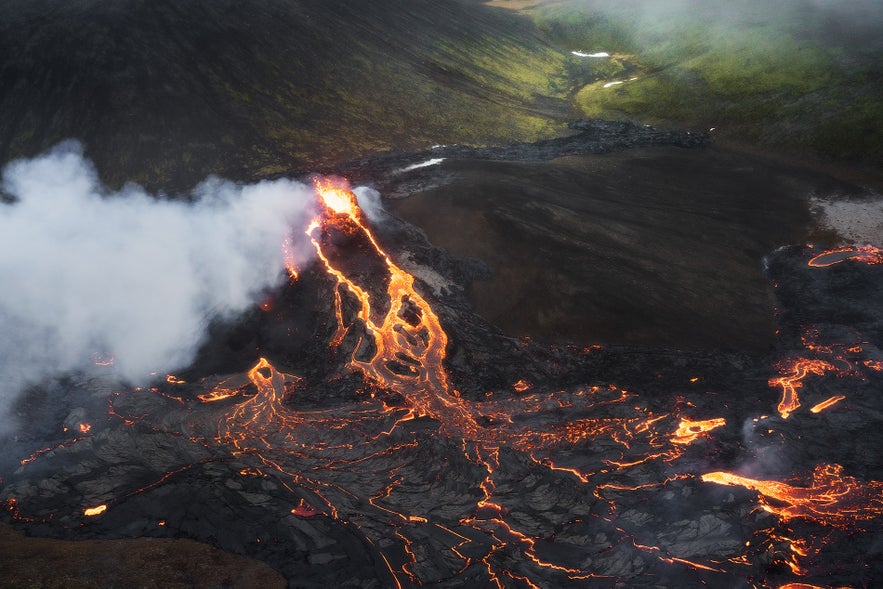
In this photograph of the Geldingadalur eruption, you can marvel at the spectacular contrast between the ominous lava and the rolling greenery behind. Iceland is famous for the unusual moss that can grow on the barren, burnt landscapes of volcanic regions such as the Reykjanes Peninsula, and soon, it will take root in this new land.
4: A Dragon Emerges
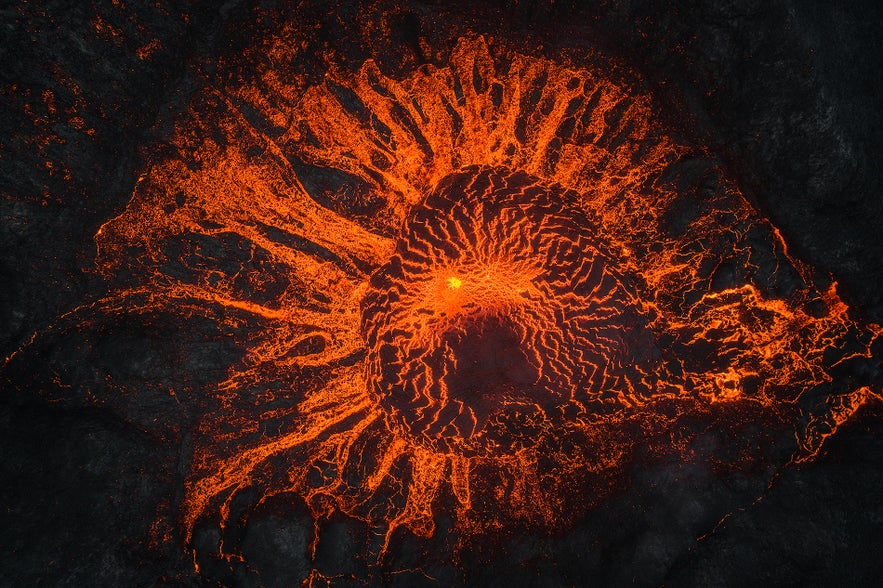
As Fagradalsfjall began its eruption in winter, the dark evenings allowed for some incredible night photography. The vividness of the orange lava and the brightness of fires come out best against the black landscapes, as can be seen in this image, where the terrifying eye of a flaming beast seems to be emerging from the crater.
5: The Edge of the Eruption
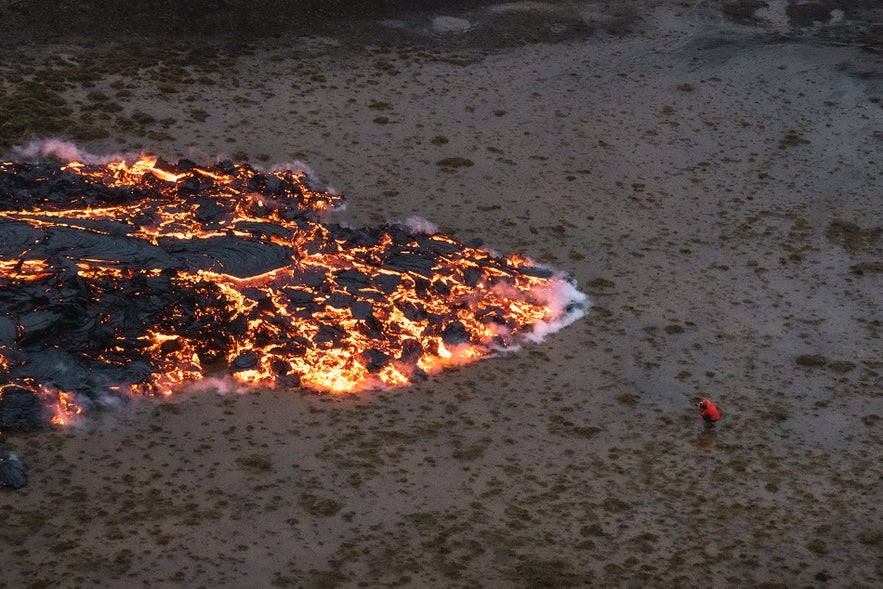
In this awe-inspiring image, you can see a photographer snapping shots at the frontier of Geldingadalur's eruption; so long as they stayed at this distance, they were relatively safe due to the slow progression of the lava. The gas you see rising around the edge of the flaming field is steam; the dampness in the surrounding ground evaporates with a hiss the moment it comes in contact with the heat.
6: An Aerial View of Fagradalsfjall
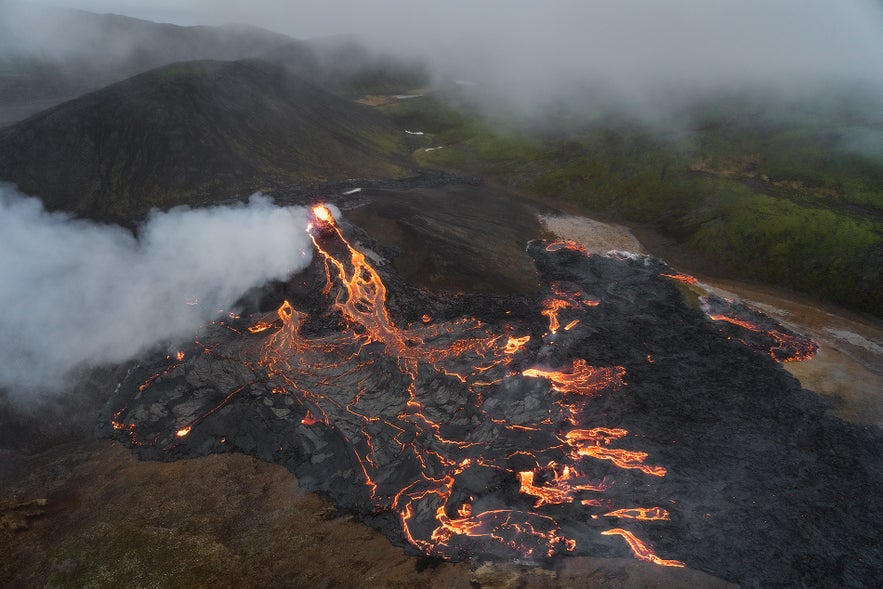
The eruption at Geldingadalur began as a fissure around 700 meters long; as you can see in this aerial photograph of the Icelandic volcano, however, a single main crater quickly began to form and rise. Now, there is a new distinctive cone-shaped peak on the Reykjanes Peninsula skyline!
7: A Field of Lava
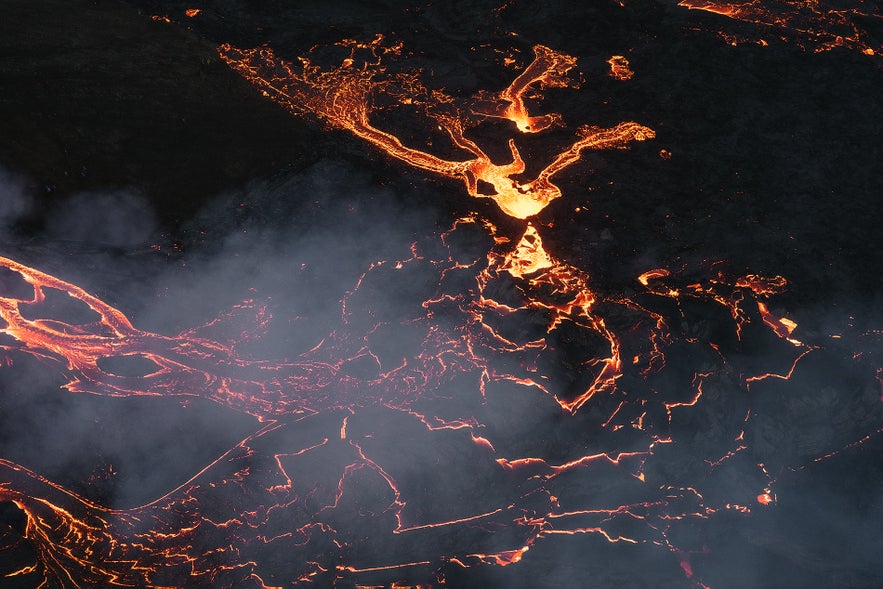
In this photo of Iceland's erupting volcano, you can see how the fissure's heat kept the molten rock from ever fully solidifying; the red currents of lava appear as a glowing version of the Nazca Lines. Despite its small size and gentle flow, there is a deep magma chamber beneath Geldingadalur, meaning that scientists had few reliable predictions on how long Fagradalsfjall's eruption would last.
8: New Land is Born
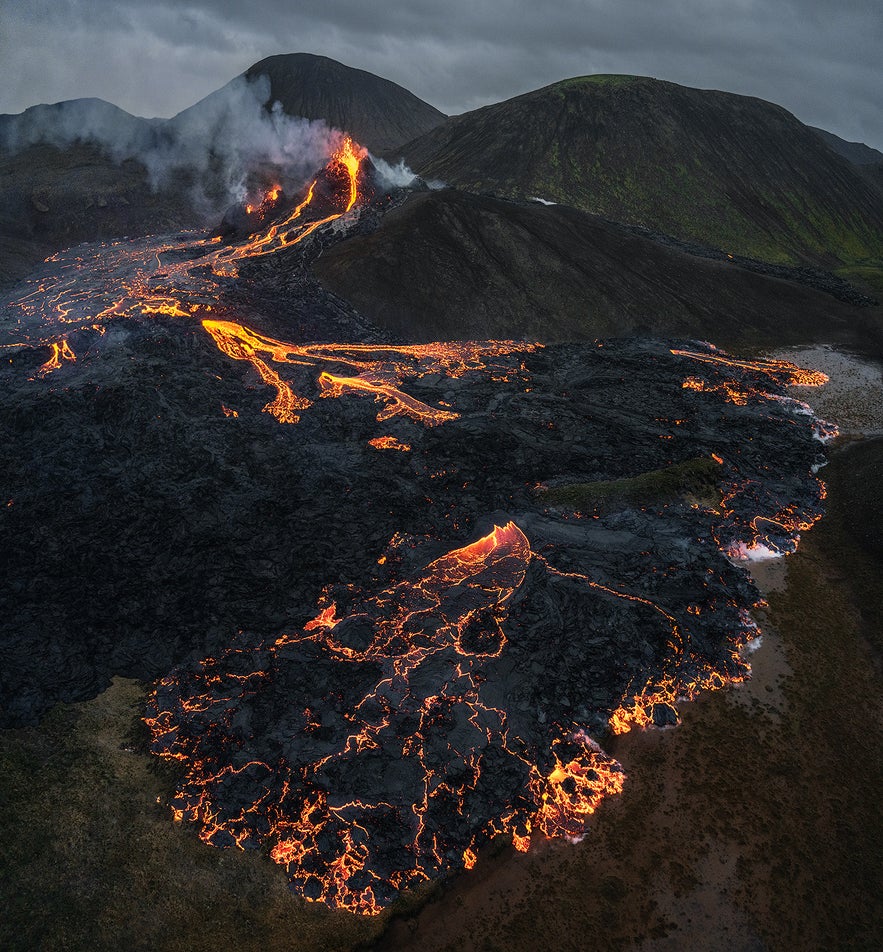
Here, you can marvel over the edge of the vast lava that field emerged from Fagradalsfjall volcano; this area is still steaming due the eruption's heat. As this new rock cools from the outside in, it will contract and form underground tunnels, which in the future may allow lava caving tours beneath this new landscape.
See also: Lava Cave Tours
9: A Battle of Ice and Fire
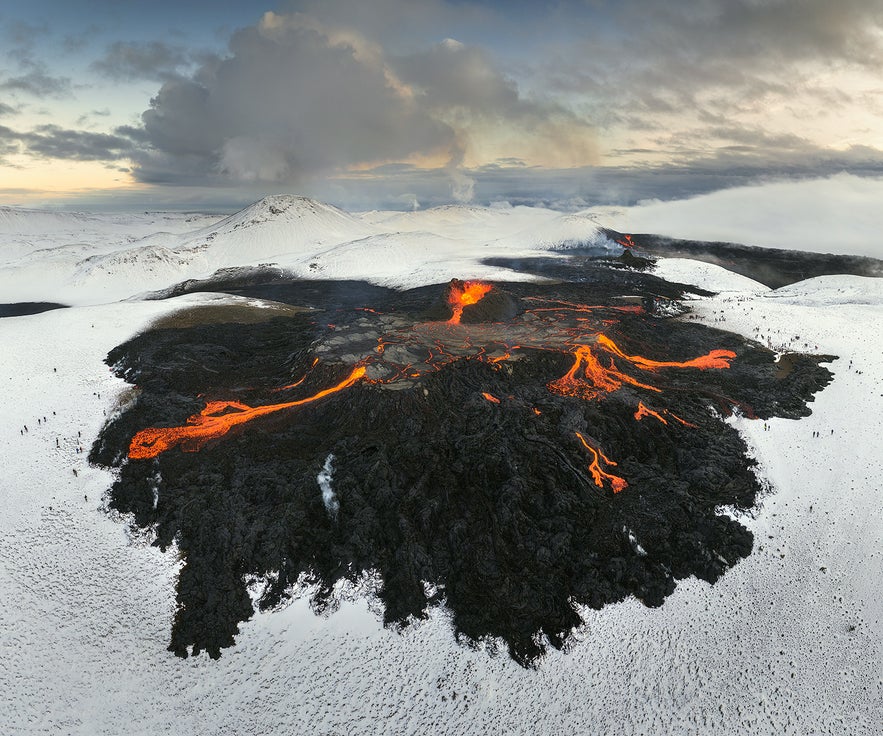
Due to the volatile climate of Iceland in winter and spring, it was possible to photograph the Fagradalsfjall volcano in many different conditions; heavy snows allowed it to reveal why Iceland has the nickname 'the Land of Ice and Fire'. As hot as 1,250 degrees Celsius, no snow could settle even close to the eruption site, instead encircling the searing rock and lava rivers.
For those visiting, this was a helpful marker as to where it was safe to walk!
10: Fountains of Fire
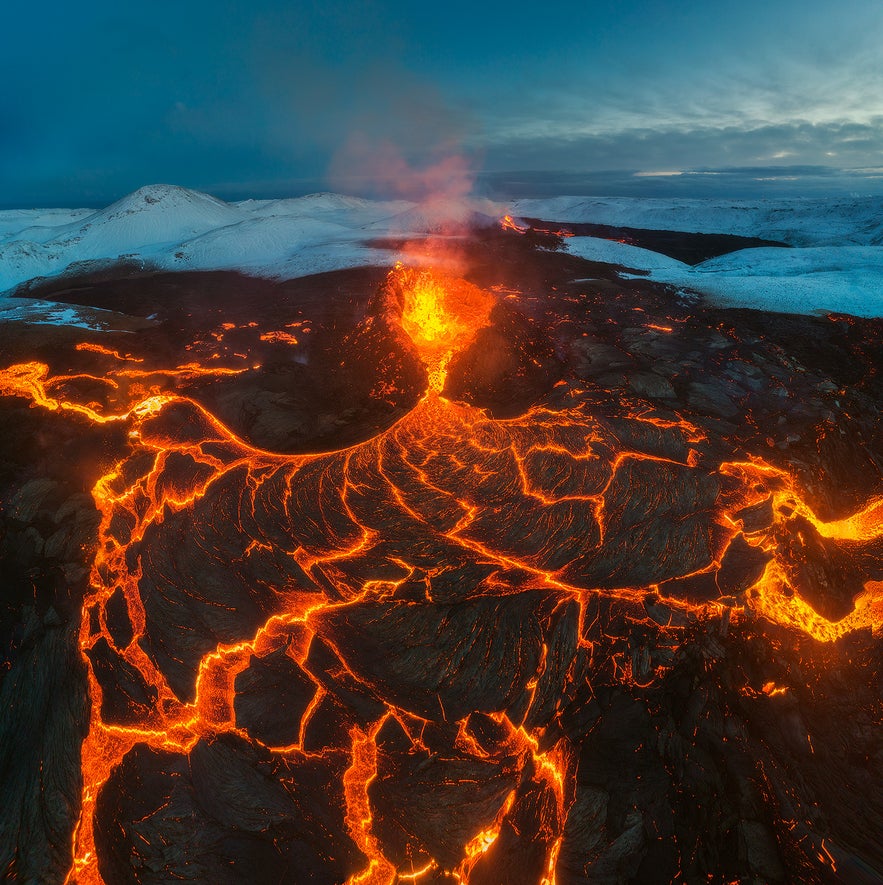
Even though the lava flow was not technically explosive, there were still beautiful fountains of fire. The magma was rising under enormous pressure, meaning that you’d regularly see molten rock and licks of flame bursting from the craters and fissure. In this breathtaking photo of the Fagradalsfjall eruption on the Reykjanes Peninsula, you can see jets of fiery orange arching over the site.
Otros artículos interesantes

Volcanes de Islandia: La Guía Completa
Descubre datos fascinantes sobre los volcanes de Islandia, uno de sus fenómenos de la naturaleza más característicos. Conoce la actividad volcánica de Islandia y las erupciones más famosas de la his...Leer másLa Guía Completa del Sol de Medianoche en Islandia
Entérate de todo lo que debes saber sobre el sol de medianoche en Islandia, como cuánto tiempo dura el atardecer y el amanecer, en qué meses tiene lugar el sol de medianoche y algunos consejos de ut...Leer más
Visitar Islandia en Enero | La Guía Definitiva
Entérate de todo lo que debes saber sobre viajar a Islandia en enero, uno de los mejores meses para disfrutar de las cuevas de hielo, las rutas de senderismo glaciar y la caza de auroras boreales. ¡De...Leer más

Descarga la mayor plataforma de viajes a Islandia en tu móvil para gestionar tu viaje al completo desde un solo sitio
Escanea este código QR con la cámara de tu móvil y pulsa en el enlace que aparece para añadir la mayor plataforma de viajes a Islandia a tu bolsillo. Indica tu número de teléfono o dirección de correo electrónico para recibir un SMS o correo electrónico con el enlace de descarga.

